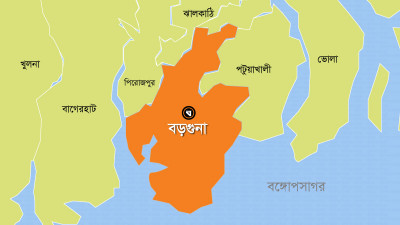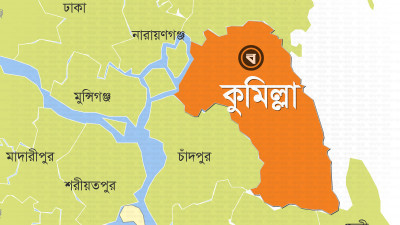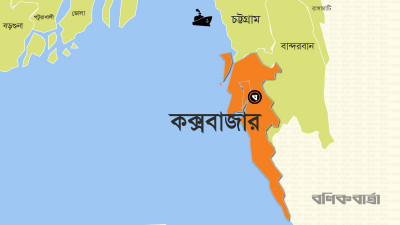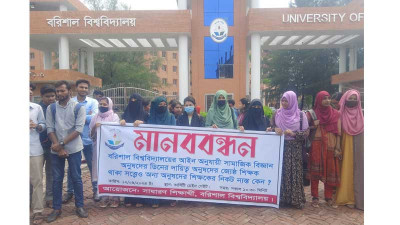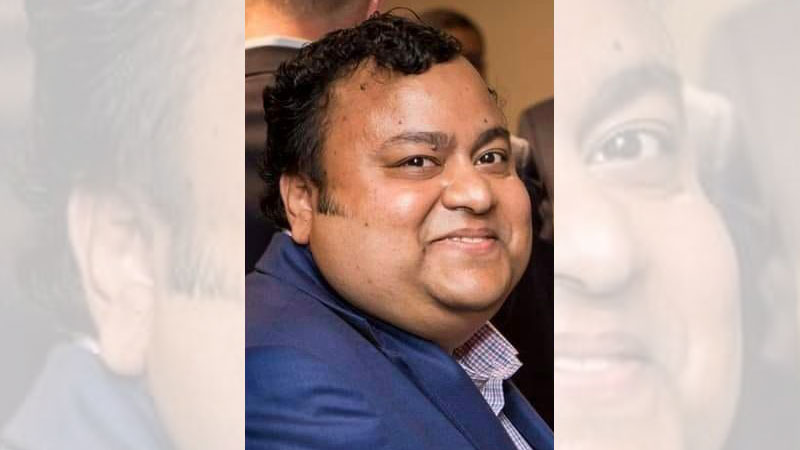 Photo: Bonik Barta
Photo: Bonik Barta Chowdhury
Nafeez Sarafat, a former bank official, obtained a license for an asset
management company named RACE Management PCL in 2008. He was accompanied by Dr.
Hasan Taher Imam as his associate. The asset management firm gained significant
attention at the time by conducting various workshops related to the capital
market. They vowed to transform the mutual fund sector in the country. However,
they were later blamed for the severe disinterest among investors in mutual
funds. Throughout this period, Sarafat received support from the Bangladesh
Securities and Exchange Commission (BSEC) and enjoyed numerous advantages from
both the Bangladesh Bank and the Ministry of Finance. Nafeez Sarafat, once a
bank officer, gradually emerged as one of the most influential mafia figures in
the financial sector of the country. His ties to the upper echelons of the
Awami League government were solidified by his roots in Gopalganj. He
reportedly referred to former Prime Minister Sheikh Hasina as ‘Aunt’.
Leveraging these connections, he rose to prominence during the tenure of the
ousted government, becoming a formidable economic hitman. His wrath led to the
imprisonment of writer Mushtaq Ahmed and cartoonist Ahmed Kabir Kishore, both of
whom endured severe torture. Mushtaq Ahmed eventually died in custody.
Following the fall of Sheikh Hasina’s government, the Anti-Corruption
Commission (ACC) recently launched an investigation into Sarafat’s acquisition
of banks and embezzlement of funds from the capital market.
After
RACE’s inception in 2008, the firm secured the management of 10 closed-end
mutual funds by 2013. Currently, the company manages 13 funds. Sarafat and Imam
primarily used these mutual funds to generate personal wealth. They invested
fund money to purchase shares of the Farmers Bank (now Padma Bank), securing
directorships on the bank’s board. In addition to these two, Sarafat’s wife,
Anjuman Ara Shahid, was also among the bank's founders. Despite these
investments, the funds reaped no benefits. When Farmers Bank’s then-chairman
and former Home Minister Mohiuddin Khan Alamgir stepped down amid a scandal,
Sarafat took over as the bank's chairman. He rebranded the bank as Padma Bank.
To rescue the bank from its irregularities and corruption, the state-owned
Investment Corporation of Bangladesh and four state-owned banks—Sonali, Janata,
Agrani, and Rupali—had to provide a capital injection of BDT 7.15 billion.
Upon
becoming the chairman of Padma Bank, Sarafat expanded his influence in the
financial sector. By joining the association of bank owners, he elevated his
status to that of an elite businessman. Using his personal relationship with
former Prime Minister Sheikh Hasina, Sarafat grew increasingly powerful and
reckless. He also claimed former IGP Benazir Ahmed as his cousin and maintained
close ties with top officials of intelligence agencies. By leveraging these
connections, Sarafat succeeded in whatever endeavor he pursued.
Sarafat
had strong ties with influential figures in the banking and financial sector,
including Salman F. Rahman and Nazrul Islam Mazumder. He involved Mazumder with
his media outlets. There are rumors that when Salman F. Rahman was encouraging
people to invest in shares of Beximco Limited to boost the company’s stock
price, Sarafat also invested fund money in the company’s shares. However, when
Sarafat later sold Beximco shares without informing Salman F. Rahman, the stock
price plummeted, angering Rahman.
Amid
the fallout with Salman F. Rahman, Nafeez Sarafat established a close
relationship with former Finance Minister AHM Mustafa Kamal. He also developed
ties with the then-Finance Secretary Abdur Rouf Talukder. Sarafat leveraged his
relationship with Mustafa Kamal to push for the direct listing of Best
Holdings’ IPO, though this attempt ultimately failed. A few years later,
Sarafat managed to list Best Holdings through the intervention of former BSEC
Chairman Professor Shibli Rubayat Ul Islam. Nafeez Sarafat arranged for the
placement shares of Best Holdings to be allocated in the names of former IGP
Benazir Ahmed’s two daughters. By gifting placement shares to various
influential individuals and intelligence officials, Sarafat maintained his
power. He used this influence to secure various benefits, ensuring that none of
his work was stalled in any government office. Many individuals, in turn,
maintained good relations with Sarafat to protect their own interests. Sarafat allegedly
took large sums from them for lobbying.
Sarafat
always aimed for large projects in his planning. However, his lobbying efforts
to secure the approval of the IPO for a small company like ‘Coppertech
Industries’ surprised many. Sarafat had gifted placement shares of Coppertech
Industries to numerous influential figures. As a result, he was determined to
list the company on the stock market by any means necessary. However, when
reports of irregularities in Coppertech’s financial statements surfaced in the
media, the listing process was halted. The Financial Reporting Council (FRC)
recommended punitive action against the auditor following an investigation,
leading the Institute of Chartered Accountants of Bangladesh (ICAB) to ban the
auditor, Ahmad & Akhter. At that time, Sarafat lobbied with the FRC to address
the Coppertech issue.
CQK
Mustaq Ahmed, the former chairman of the Financial Reporting Council (FRC),
told Bonik Barta, “Chowdhury Nafeez Sarafat approached me regarding
Coppertech’s IPO at that time. I questioned why he was involved, as he wasn’t connected
to the company. However, he couldn’t influence me on this matter. I had
recommended punitive action against the company’s auditor. I didn’t have the
authority to halt the IPO. The IPO was eventually was approved. Additionally, Asadul
Islam, who was then the Secretary of the Financial Institutions Division, also
called me about Coppertech’s IPO.”
Nafeez
Sarafat eventually persuaded a former president of the Dhaka Stock Exchange
(DSE) to send a letter from the stock exchange to the Bangladesh Securities and
Exchange Commission (BSEC) seeking legal exemption for Coppertech’s listing.
Following this, BSEC granted the exemption, and Coppertech was eventually
listed. MTB Capital’s CEO, Khairul Bashar Abu Taher Mohammed, who was
responsible for issue management during the company’s IPO process. He later
received assistance from Nafeez Sarafat in securing his appointment as the
DSE’s Chief Regulatory Officer (CRO). He continues to hold the CRO position at
DSE.
Despite
adverse remarks from the stock exchange, several IPOs were approved during the
tenure of BSEC’s former chairman, Professor Dr. M. Khairul Hossain. However,
after criticism arose regarding Coppertech’s IPO, the commission adopted a
policy of not approving IPOs without the stock exchange’s opinion. The
responsibility for approving Coppertech’s IPO was strategically shifted to DSE,
even though the commission had the legal authority to cancel the IPO.
Additionally, despite various allegations against RACE, Khairul’s commission
did not initiate any investigation or punitive action. Even a decision to
inspect RACE’s activities was not implemented. Furthermore, citing the Ministry
of Finance’s recommendation, Khairul’s commission issued a notification
extending the tenure of closed-end mutual funds by another 10 years. Certain
individuals, posing as investors, had lobbied the Ministry of Finance for this
extension. Subsequently, the Ministry of Finance recommended to BSEC that the
tenure be extended, and BSEC issued the notification with its consent. However,
BSEC had full legal authority not to make this decision in the interest of the
capital market and investors.
When
asked about this, BSEC’s former chairman, Professor Dr. M. Khairul Hossain,
told Bonik Barta, “I did not make any decisions unilaterally. The commission
made the decision collectively. Moreover, Commissioner Nizami was in charge of
the Mutual Funds Division, and I did not interfere in his work. I had
instructed an inspection of RACE’s activities. Commissioner Nizami knows best
why it was not implemented later. I had no role in extending the tenure of
mutual funds; it was extended due to the Ministry of Finance’s directive. I
even sent a letter to the Ministry of Finance stating that extending the tenure
might not be appropriate.”
During
Khairul’s tenure as chairman, Professor Md. Helal Uddin Nizami, the
commissioner in charge of the Mutual Funds Division, had shown various forms of
favor to RACE. Regarding decisions related to mutual funds, Dr. M. Khairul
advised speaking with former commissioner Nizami. However, efforts to contact
Professor Md. Helal Uddin Nizami for comment were unsuccessful.
Recently,
Formanul Islam, the former managing director of Bangladesh Infrastructure
Finance Fund Limited (BIFFL), posted on social media that Chowdhury Nafeez
Sarafat had pressured him to invest BDT 5 billion in bonds issued by Best
Holdings. He mentioned that at that time, Salman F. Rahman and Chowdhury Nafeez
Sarafat were present in the office of then-Finance Secretary Abdur Rouf
Chowdhury. Shortly after that meeting, Formanul Islam was forced to resign from
BIFFL.
After
setting his sights on Padma Bank, Nafeez Sarafat turned his attention to
Southeast Bank. He strategically ousted the bank’s former chairmen, MA Kashem
and Azim Uddin Ahmed, from the board. In this effort, Southeast Bank’s chairman
Alamgir Kabir sought Sarafat’s assistance to consolidate his control over the
bank. Legal actions were initiated against Azim and Kashem through the
Anti-Corruption Commission (ACC), citing allegations of irregularities at North
South University. Following these allegations, both were removed from their
positions on the bank’s board. Subsequently, Nafeez Sarafat made his wife,
Anjuman Ara Shahid, as the bank’s director. He also attempted to appoint his
son, Chowdhury Rahib Sarafat, as a director. But this effort was did not come
to fruition due to his son’s lack of experience.
Nafeez
Sarafat also gained control over several publicly listed companies, including
Unique Hotel & Resorts and National Tea Company. He joined the board of
Unique Hotel as a nominee director of the company founded by Noor Ali.
Additionally, he acquired ownership stakes in Unique Meghnaghat Power. He took
on the role of managing director primarily through his company, Strategic
Finance Limited (SFL). Although the main investor of this 584 MW power plant is
Unique Group, Nafeez Sarafat was in charge of getting various types of negotiations
and approvals. As a result, he was able to make hefty profits from this project
even with a small investment. The ownership of the power plant is divided among
SFL, which holds 38.76 percent, Unique Hotel & Resorts, which holds 37.24
percent, and Qatar-based Nebras Power, which holds 24 percent. Notably, 24
percent of the shares in the power plant were sold to Nebras Power for $24
million. In this case, 51 percent shares were sold by Nafeez Sarafat’s company
SFL and 49 percent shares were sold by Unique Hotel. By selling these shares, Sarafat's
company made a profit of more than a hundred million.
As
a nominee director of Finex Software Limited, Nafeez Sarafat also secured a
position on the board of publicly listed ‘National Tea Company’. The company
received approval from the Bangladesh Securities and Exchange Commission (BSEC)
to raise BDT 2.79 billion by issuing new shares. Recently, the subscription
period for the capital increase was extended until September 19.
Nafeez
Sarafat’s efforts to list Best Holdings through a direct listing were thwarted
by the Shibli Commission. Although this commission eventually approved the
company’s listing through an IPO. However, the commission, during its tenure
was criticized for not taking visible action against various irregularities at RACE.
Despite attempts to contact former BSEC Chairman Professor Shibli Rubayat Ul Islam
and RACE Chairman Chowdhury Nafeez Sarafat for comments, they did not respond.
Since
RACE’s inception, Chowdhury Nafeez Sarafat and Dr. Hasan Taher Imam jointly
managed the fund. However, over the past three to four years, conflicts arose
between them, even leading to a court battle over the ownership and control of RACE.
Sarafat holds a 25 percent stake in RACE, while Imam holds 75 percent. Both
Sarafat and Imam have faced allegations of misusing RACE’s funds for personal
gain. As managing director of RACE, Imam was also involved in questionable
investment decisions. There are allegations that Imam installed three directors
on the board of Bangladesh General Insurance Company (BGIC), which served as a
trustee for several of RACE’s funds. He did so by purchasing shares under
various private entities’ names. Additionally, there are claims that Imam
facilitated transactions through Multi Securities at higher commission rates
for RACE’s funds, while other clients were charged half the commission rate.
Market observers believe that Imam was responsible for controversial investment
decisions, such as corporate bonds for Regent Spinning Mills and Padma Bank.
When
asked about these allegations, Hasan Taher Imam, managing director of RACE
Management PCL, told Bonik Barta, “At the time of investing in Regent
Spinning’s bonds, the company was in good condition. The investment in Padma
Bank was made with future prospects in mind. Although higher commissions were
paid for transactions of RACE’s funds through Multi Securities, we received
returns on investments from the securities. When this is adjusted, it would
reduce commission expenses. The conflict with Nafeez Sarafat arose from
disagreements over several investments. I have faced harassment and persecution
over the past few years. BSEC Chairman Shibli Rubayat also harassed me in
various ways. I have filed a lawsuit against Sarafat and BSEC’s decisions. The
investments made through BGIC as trustee for RACE’s funds were not made
directly in the company but through private entities. Even though we were on
the trustee board, we did not play a role in influencing decisions.”
RACE
Management has come under scrutiny for allegedly engaging in substantial block
market transactions through their managed funds, in violation of mutual fund
regulations. Consequently, the Bangladesh Securities and Exchange Commission
(BSEC) has suspended block market transactions for all funds managed by RACE
until further notice. Additionally, trading privileges for Multi Securities and
Services Limited in the block market have also been suspended. This decision
was formalized in an order issued by BSEC on July 4.
However,
Hasan Taher Imam of RACE disputed the allegations, claiming that the
transactions did not violate any laws. He accused BSEC of issuing the directive
unlawfully.
During
Shibli's tenure as Commissioner, the Mutual Fund Division was overseen by
former Commissioner Professor Dr. Mizanur Rahman. When contacted, he told Bonik
Barta, “An investigation spanning over a year into RACE's assets and
investments did not reveal any significant irregularities. However, upon
learning of RACE’s affiliated individuals on the board of BGIC, BSEC decided to
remove BGIC from its trustee duties for the funds. This was a matter of
conflict of interest.”
Regarding
the allegations of front running through RACE’s funds, Dr. Rahman said, “This
issue was not part of the terms of reference during our investigation.
Moreover, it is a time-consuming task. Since there are accusations, the
Commission may choose to conduct a thorough investigation if it deems
necessary.”
Nafeez Sarafat, as owner of the Canadian University of Bangladesh, is embroiled in another controversy over the alleged irregular allocation of a plot in Rajuk's Purbachal New Town project. It is claimed that Sarafat used his influence to secure the plot. He also involved former IGP Benazir Ahmed in the matter. Moreover, in return for providing capital support to Padma Bank, Sarafat allegedly rewarded former ICB Managing Director Kazi Sanaul Hoq with the position of Managing Director of the Dhaka Stock Exchange (DSE) after his retirement. However, Hoq’s tenure at the Exchange was short-lived. He later became Chairman of Rupali Bank, a position from which he was recently removed.
The cartoon on the left, drawn by Ahmed Kabir Kishore in 2022, depicts Nafeez Sarafat, while the one on the right was drawn in 2020.
Sarafat’s
influence grew significantly after the 2018 national elections. He played a key
role in bringing several foreign observers to Bangladesh, who controversially
declared the election to be fair. This further proved Sarafat’s standing with
the government. In May 2020, cartoonist Ahmed Kabir Kishore and writer Mushtaq
Ahmed were arrested under the Digital Security Act for drawing cartoons about
Sarafat's control over banks. Kishore was taken from his home on May 2, and
Mushtaq on May 4. Both were subjected to severe physical and psychological
torture after their arrests. After that, they were shown arrested in a case by RAB
on May 5. Over a 10-month period, their bail petitions were rejected at least
six times. Mushtaq Ahmed died in custody on February 25, 2021, at the Kashimpur
High-Security Prison. Kishore was released on bail in March of the same year.
He later revealed in a media interview that he was questioned about drawing
cartoons of a bank chairman while being tortured. According to sources, Nafeez
Sarafat was present during the torture of Kishore and Mushtaq. It was Sarafat
who allegedly ordered their inhumane treatment, using former IGP Benazir Ahmed
to exact punishment over the drawing of cartoons. Mushtaq’s death on February
25, 2021, prompted expressions of grief and deep concern from the United
States, France, Germany, Italy, the Netherlands, Denmark, Norway, Spain,
Sweden, Switzerland, the European Union, as well as the High Commissioners of
the United Kingdom and Canada. These 13 diplomats called for a prompt, transparent,
and independent investigation into the circumstances surrounding Mushtaq's
death. UN High Commissioner for Human Rights Michelle Bachelet also urged the
Bangladesh government to ensure a swift, transparent, and independent
investigation into both Mushtaq Ahmed’s death and the allegations of torture
against cartoonist Kishore. Human Rights Watch issued a statement demanding an
impartial investigation into Mushtaq Ahmed’s death. Nationally, the incidents
involving the abuse of Kishore and Mushtaq drew sharp reactions from the
National Human Rights Commission and Transparency International Bangladesh
(TIB).
According
to RACE's latest portfolio report, as of June 30, the total assets under
management across 12 funds amounted to BDT 32.37 billion at purchase cost.
However, the market value of these assets stood at BDT 23.5 billion, reflecting
a decline of BDT 8.87 billion. During this period, BDT 5.99 billion was
invested in unlisted securities at market value. The purchase cost of these
investments was BDT 6.33 billion. A significant portion of these investments
was made in bonds issued by Padma Bank, Multi Securities, and Regent Spinning.
Over the past five years, the compound annual growth rate (CAGR) of net asset
value (NAV) returns for RACE's closed-end mutual funds has been a negative 1.1
percent.

